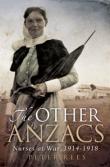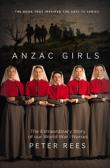AustLit
Latest Issues
AbstractHistoryArchive Description
'By the end of The Great War, forty-five Australian and New Zealand nurses had died on overseas service and over two hundred had been decorated. These were women who left for war on an adventure, but were soon confronted with remarkable challenges for which their civilian lives could never have prepared them. They were there for the horrors of Gallipoli and they were there for the savagery of the Western Front. Within twelve hours of the slaughter at Anzac Cove they had over 500 horrifically injured patients to tend on one crammed hospital ship, and scores of deaths on each of the harrowing days that followed. Every night was a nightmare. Their strength and humanity were remarkable. Using diaries and letters, Peter Rees takes us into the hospital camps, and the wards and the tent surgeries on the edge of some of the most horrific battlefronts of human history. But he also allows the friendships and loves of these courageous and compassionate women to enrich their experiences, and ours.'
Source: Book jacket.
Adaptations
-
form
y
 ANZAC Girls
( dir. Ian Watson
et. al. )agent
Australia
:
Screentime
ABC Television
,
2013
Z1917858
2013
series - publisher
film/TV
'In December 1914, the first women volunteers for the Army Nursing Service sailed from Australia bound for the Great War. Diverted to Egypt in preparation for the Gallipoli campaign they served in Alexandria, Gallipoli, Lemnos and on the Western Front. Through shocking hardship they experienced exceptional friendship, passionate love, success and heartbreak. ' (Source: Australian Television website)
ANZAC Girls
( dir. Ian Watson
et. al. )agent
Australia
:
Screentime
ABC Television
,
2013
Z1917858
2013
series - publisher
film/TV
'In December 1914, the first women volunteers for the Army Nursing Service sailed from Australia bound for the Great War. Diverted to Egypt in preparation for the Gallipoli campaign they served in Alexandria, Gallipoli, Lemnos and on the Western Front. Through shocking hardship they experienced exceptional friendship, passionate love, success and heartbreak. ' (Source: Australian Television website)
Publication Details of Only Known VersionEarliest 2 Known Versions of
Other Formats
- Also large print.
Works about this Work
-
“They Said It'd Be an Adventure” : Masculinity, Nation, and Empire in Centennial Australian World War I Film and Television
2018
single work
criticism
— Appears in: Journal of Popular Culture , vol. 51 no. 6 2018; (p. 1356-1375)'The World War I Gallipoli campaign in modern Turkey in April 1915 was calamitous from the outset, with the amphibious assault by British and Allied forces landing well off course. Australia's first major military engagement since achieving nationhood in 1901, its chief success would become their stealth evacuation, which saw seventy thousand men covertly withdrawn over nine days and nights in December 1915. The campaign was ultimately futile and deemed immaterial to the outcome of the war. Such an ignominious defeat at the hands of the Ottoman Empire would seem an unlikely source for a national myth. It lacks, for example, “the psychic reassurance of triumph over the sources of threat” and the defeat of enemies that Graham Dawson identifies as a key psychic and social function of adventure narratives and soldier heroes (282). Yet, the ill‐fated Gallipoli campaign is popularly held in Australia's cultural imagination as the “birth of a nation” for a former colony then still under the yoke of the British Empire. In Australian politics and culture, the youthful nation's presumed character was forged in war and embodied in the deeds of its young men, in spite of ultimate defeat.' (Introduction)
-
“They Said It'd Be an Adventure” : Masculinity, Nation, and Empire in Centennial Australian World War I Film and Television
2018
single work
criticism
— Appears in: Journal of Popular Culture , vol. 51 no. 6 2018; (p. 1356-1375)'The World War I Gallipoli campaign in modern Turkey in April 1915 was calamitous from the outset, with the amphibious assault by British and Allied forces landing well off course. Australia's first major military engagement since achieving nationhood in 1901, its chief success would become their stealth evacuation, which saw seventy thousand men covertly withdrawn over nine days and nights in December 1915. The campaign was ultimately futile and deemed immaterial to the outcome of the war. Such an ignominious defeat at the hands of the Ottoman Empire would seem an unlikely source for a national myth. It lacks, for example, “the psychic reassurance of triumph over the sources of threat” and the defeat of enemies that Graham Dawson identifies as a key psychic and social function of adventure narratives and soldier heroes (282). Yet, the ill‐fated Gallipoli campaign is popularly held in Australia's cultural imagination as the “birth of a nation” for a former colony then still under the yoke of the British Empire. In Australian politics and culture, the youthful nation's presumed character was forged in war and embodied in the deeds of its young men, in spite of ultimate defeat.' (Introduction)




